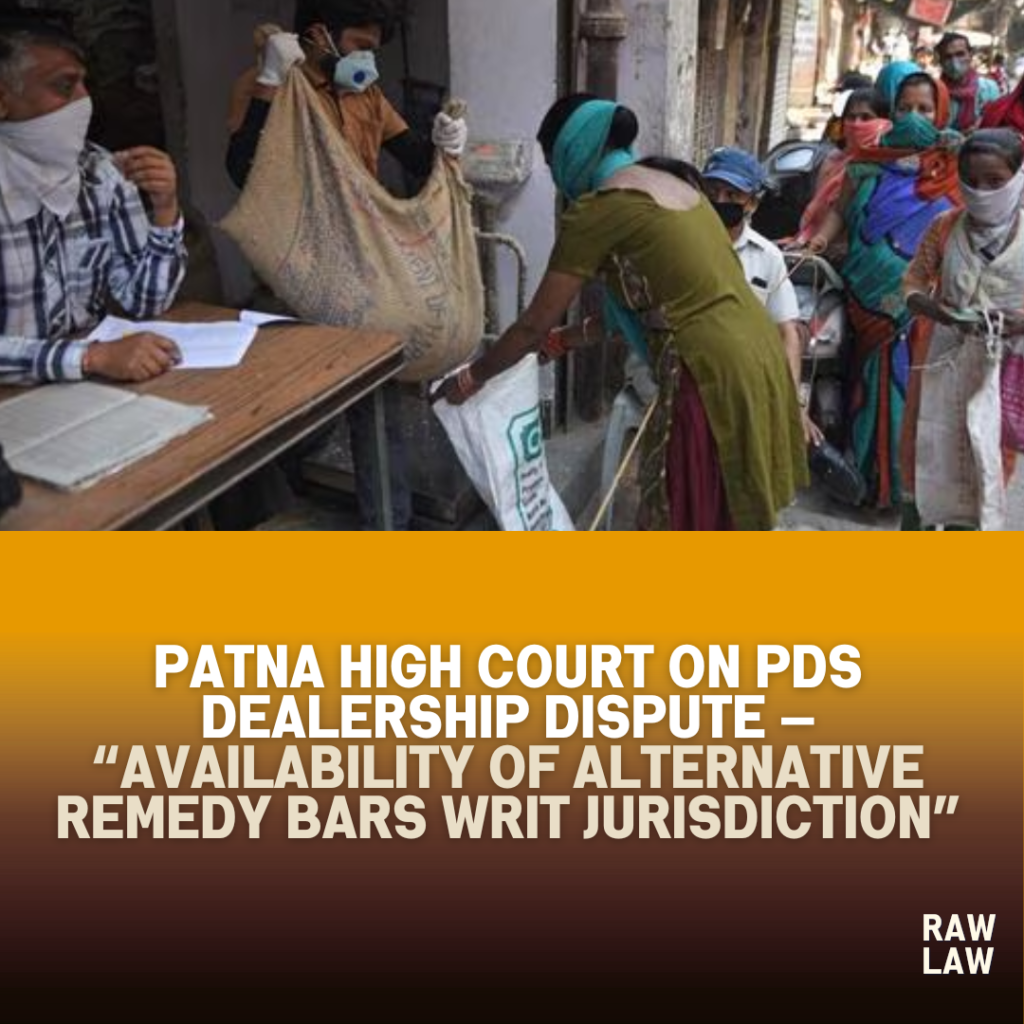Court’s Decision
The Patna High Court dismissed the writ petition challenging the rejection of the petitioner’s application for appointment as a Public Distribution System (PDS) dealer, holding that the petitioner had an alternative and efficacious statutory remedy under the Bihar Targeted Public Distribution System (Control) Order, 2016. The Court directed the petitioner to approach the competent authority by filing a complaint or application within one month. The authority was instructed to condone any delay in filing under Section 5 of the Limitation Act and dispose of the application within three months
.
Facts
The petitioner applied for selection as a PDS dealer but his application was rejected by the District Selection Committee, which instead appointed another candidate. Aggrieved, he approached the High Court seeking to set aside the rejection and to direct his appointment in place of the private respondent.
The petitioner argued that the rejection was arbitrary and that he was more qualified and suitable for the dealership. The State, however, contended that the writ petition was not maintainable as the petitioner had an alternative statutory remedy under the Bihar Targeted Public Distribution System (Control) Order, 2016, which provided avenues for appeal and revision.
Issues
- Whether a writ petition is maintainable when a statutory alternative remedy of appeal and revision exists.
- Whether the petitioner’s grievance regarding rejection of his application as a PDS dealer could be entertained directly under Article 226 of the Constitution.
- Whether delay in filing appeal or revision could be condoned.
Petitioner’s Arguments
The petitioner contended that his application for appointment as a PDS dealer was rejected unfairly and that the appointment of the private respondent was unjust. He urged the Court to quash the impugned rejection and direct his appointment. He further submitted that although he intended to file a representation or appeal, the limitation period for doing so had lapsed, and thus, the Court should intervene and allow him relief in writ jurisdiction.
Respondent’s Arguments
The respondents opposed the writ petition, contending that Section 32 of the Bihar Targeted PDS (Control) Order, 2016 provided a clear statutory remedy of appeal before the District Magistrate and revision before the Divisional Commissioner. They argued that the petitioner should first exhaust these remedies rather than invoke writ jurisdiction. They stressed that since the petitioner had a specific remedy available under the statute, the writ petition was barred by the principle that writ jurisdiction cannot be invoked where effective alternative remedies exist.
Analysis of the Law
The Court examined Section 32 of the Bihar Targeted PDS (Control) Order, 2016:
- Section 32(iii): Provides for appeal to the District Magistrate within 30 days of denial, cancellation, or non-renewal of license.
- Section 32(v): Allows the Appellate Authority to stay the operation of the impugned order until disposal of appeal.
- Section 32(vi): Provides for revision before the Divisional Commissioner in case the appeal is not disposed of within 60 days or against the appellate order.
Thus, the law created a complete framework of remedies to address grievances of applicants and dealers under the PDS system.
The Court reiterated the settled principle that where a statutory mechanism for appeal and revision exists, writ jurisdiction should not ordinarily be invoked unless exceptional circumstances such as violation of fundamental rights, lack of jurisdiction, or breach of natural justice are demonstrated.
Precedent Analysis
While the judgment did not refer to multiple external cases, the reasoning closely follows established Supreme Court jurisprudence such as:
- Whirlpool Corporation v. Registrar of Trademarks (1998) — which held that writ jurisdiction may not be exercised when an alternative remedy exists, except in exceptional circumstances.
- Union of India v. Guwahati Carbon Ltd. (2012) — which emphasized the doctrine of exhaustion of remedies before invoking writ jurisdiction.
These principles were implicitly applied in dismissing the writ petition.
Court’s Reasoning
The Court found that the petitioner had an effective remedy of appeal and revision under Section 32 of the 2016 Control Order. Since the District Magistrate himself was the head of the Selection Committee and could not review his own decision, the Court directed the petitioner to approach the Divisional Commissioner instead.
Recognizing the petitioner’s concern that limitation had lapsed, the Court invoked Section 5 of the Limitation Act, allowing condonation of delay in filing the application. The Court thus balanced statutory procedure with fairness by ensuring the petitioner was not left remediless despite procedural delay.
Conclusion
The writ petition was dismissed with liberty to the petitioner to file a complaint/application before the Divisional Commissioner within one month. The Court directed that any delay in filing be condoned and that the application be disposed of within three months. Interlocutory applications, if any, were also disposed of.
Implications
This judgment reinforces the principle that writ jurisdiction is not a substitute for statutory remedies. It underscores that grievances relating to PDS dealership must be pursued through the statutory framework provided in the Bihar Targeted PDS (Control) Order, 2016. It also highlights the Court’s willingness to protect litigants from being shut out due to limitation by directing authorities to condone delay where justified.
For future litigants, this ruling serves as a clear reminder: challenges to PDS dealership selections should be addressed first before the Appellate and Revisional Authorities rather than invoking Article 226.
FAQs
Q1. Can a writ petition be filed directly against rejection of a PDS dealership application?
Not ordinarily. The Court held that since the Bihar Targeted PDS (Control) Order, 2016 provides appeal and revision remedies, writ petitions are barred unless exceptional circumstances exist.
Q2. What is the appellate remedy under the Bihar Targeted PDS (Control) Order, 2016?
Aggrieved applicants may appeal to the District Magistrate within 30 days, and thereafter seek revision before the Divisional Commissioner if necessary.
Q3. Can delay in filing appeal or revision be condoned?
Yes. The Court directed that delay may be condoned under Section 5 of the Limitation Act, ensuring access to justice despite lapse of limitation.



